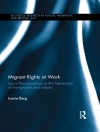China and Taiwan have built one of the most intertwined and important economic relationships in the world, and yet that relationship is not mutually open, compliant with World Trade Organization norms, or even fully institutionalized. What’s more, despite massive trade and investment flows, the boundary between the two is a serious flashpoint for potential conflict. But leaders in Beijing and Taipei have committed to normalize and deepen their economic intercourse and open a new post-Cold War era in their relationship. While the political significance of this gambit has captured attention worldwide, the scope of opening intended and the bilateral, regional, and global effects likely to ensue are as yet poorly understood.
This volume attempts to remedy that uncertainty with careful modeling combined with a qualitative assessment of the implications of the cross-strait economic opening now agreed in an Economic Cooperation Framework Agreement (ECFA). The study explores the implications for Taiwan and China, for their neighbors, and for the United States if this undertaking is fully implemented by 2020.
O autorze
Daniel H. Rosen was a visiting fellow at the Peterson Institute for International Economics. Rosen is a principal at the Rhodium Group, a New York-based research firm. He is also an adjunct professor at Columbia University’s School of International and Public Affairs (2001–present). Rosen was a member of the National Economic Council staff (2000–01), where he served as senior adviser for international economic policy. His work has focused on the economic development of East Asia, particularly greater China, and US economic relations with the region. Other areas of research include energy, agriculture and commodities, trade and environment linkages, and economic transitions and competitiveness. He is author or coauthor of
China’s Energy Evolution (forthcoming),
The Implications of China-Taiwan Economic Relations (2011),
Prospects for a US-Taiwan Free Trade Agreement (2004),
Roots of Competitiveness: China’s Evolving Agriculture Interests (2004),
The New Economy and APEC (2002),
Behind the Open Door: Foreign Enterprises in the Chinese Marketplace (1999), and
Powering China (1995).












